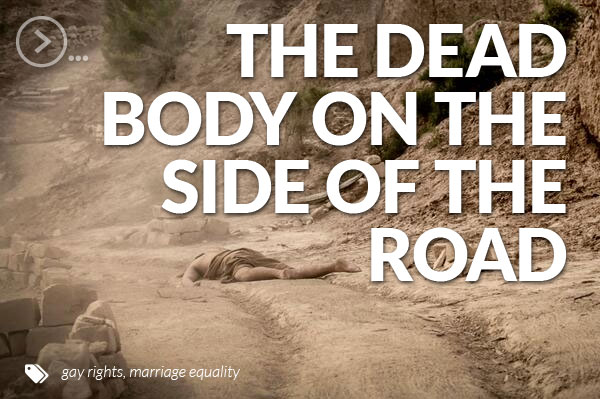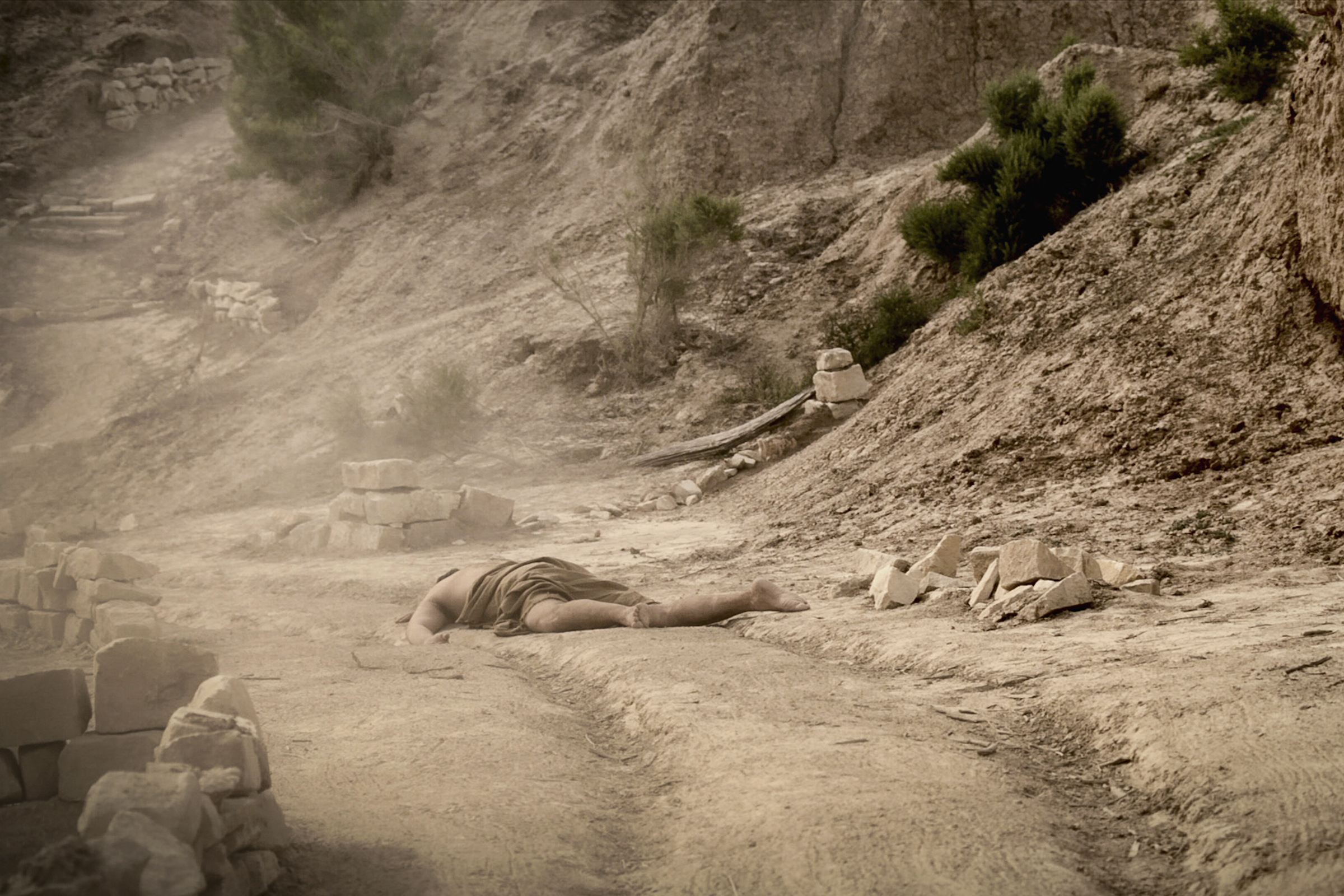

Everyone now-a-days is familiar with the story of the Good Samaritan. Growing up we're told the story to encourage us help out strangers. There's even laws called "Good Samaritan" laws that protect people from lawsuits if they stop to help someone in need. But with all that familiarity I think we've lost the point.
The Story that Launched the Story
With as popular as a story as it is, not very many people are familiar with the story that launched the story. So here's the lead-in, courtesy of The Message:
Just then a religion scholar stood up with a question to test Jesus. "Teacher, what do I need to do to get eternal life?"
He answered, "What's written in God's Law? How do you interpret it?"
He said, "That you love the Lord your God with all your passion and prayer and muscle and intelligence—and that you love your neighbor as well as you do yourself."
"Good answer!" said Jesus. "Do it and you'll live."
Looking for a loophole, he asked, "And just how would you define 'neighbor'?"
In Matthew 22:40 Jesus himself says those two commandments are the most important out of everything in all of the Jewish Tradition. He also takes it another step further and says that everything else hangs on those two things. Loving God and loving people are intertwined quiet closely. To really nail the point home look at how 1 John 4:20 puts it:
The command we have from Christ is blunt: Loving God includes loving people. You’ve got to love both.
The Gotcha! Dancers
Quick aside here. The Message uses the phrase "looking for a loophole". I'm not a big fan of that paraphrasing. The more literal translations have it as wanting to justify himself, kind of prove his worth. It's basically a "Gotcha!" question. So if this story had happened in present day Pawnee, Indiana it might look something like this:
Ok, back to the story.
The Story
Ok, now that we know the story is in response to a question about loving God and loving our neighbors, and who exactly is our neighbor, asked by a super-smart, jewish, biblical expert (while they were surronded by other super-smart, jewish, biblical experts btw), lets take a look at the actual story.
Jesus answered by telling a story. "There was once a man traveling from Jerusalem to Jericho. On the way he was attacked by robbers. They took his clothes, beat him up, and went off leaving him half-dead.
Luckily, a priest was on his way down the same road, but when he saw him he angled across to the other side. Then a Levite religious man showed up; he also avoided the injured man.
"A Samaritan traveling the road came on him. When he saw the man’s condition, his heart went out to him. He gave him first aid, disinfecting and bandaging his wounds. Then he lifted him onto his donkey, led him to an inn, and made him comfortable. In the morning he took out two silver coins and gave them to the innkeeper, saying, 'Take good care of him. If it costs any more, put it on my bill—I’ll pay you on my way back.'
"What do you think? Which of the three became a neighbor to the man attacked by robbers?"
"The one who treated him kindly," the religion scholar responded.
Jesus said, "Go and do the same."
There's so much going on in that short little story that the people Jesus is talking with would have instantly understood, but is really easy for us to miss reading it some 2,000 years later, so let's unpack it a little.
The Story Behind the Story
Jerusalem to Jericho
The road from Jerusalem to Jericho was notorious for people getting jacked like this, and even got the nickname "Way of Blood" because "of the blood which is often shed there by robbers" [?] For the audience this is more than just a theoretical situation, they might have actually been in this situation before.
Also important are the end points, Jerusalem and Jericho. Jersualem was the center of Jewish culture because it held the temple. The temple was more than just a church, it was God's own dwelling place, and it was the center of economic activity for the Jewish nation. People would come from far and wide to go to the temple, and would sell their goods in the marketplace that surrounded it. Because of that, the travelers are probably heading home, that's pretty much the only reason someone goes from Jerusalem to Jericho.
Naked, Bleeding, and Left for Dead
This dude is in rough shape, laying on the side of the road, naked since the robbers took all his clothes, bloody from the beating, and basically dead. To the Jewish people this man was "unclean", along with anyone else who touched him.
There were a whole lot of Jewish laws about staying ritually "clean". Those big books in the Old Testament that most Christians don't bother reading is full of things that can make you "unclean" and all of the things that you have to do to become "clean" again. Two of the biggies happened to be contact with blood and contact with dead bodies. In this situation the rituals to become "clean" would take 7 days, during which you were still "unclean".
So you're on your way home, excited to see your all friends and family, have a big meal, a little wine and celebration. But if you touch this man on the side of the road you can't do that because you'd be breaking God's command and become unclean.
A Priest and a Levite
... walk into a bar.
The Priest part is pretty easy to understand, they're a priest. But what's a Levite? Well, a Levite is kind of like a super-priest, like a priest with a level over 9,000. The Levites were in charge of the temple, they built it, protected it, managed it, all sorts of stuff. They were also in charge of the Arc of the Covenent, which is a super holy relic which contained the 10 Commandments and was placed in the spot within the temple were God was said to physically live. They were the only ones who would transport it, mostly because they were the only ones allowed to touch it.
In any jewish story, you would expect a Priest and a Levite to be the heros, but not in this story. In this story Jesus has them do the complete opposite of what we would expect. But it makes perfect sense. If your religious rules say God forbids you from doing something, then the super-pious wouldn't be doing it.
The "Good" Samaritan
The simple fact that this story has been handed down throughout time as "The Good Samaritan" should tip you off to how people felt about Samaritans. For baseball fans, you wouldn't need to specify The Good New York Yankees, they're pretty much always good. But throw the word good in front of Chicago Cubs, and now you've got an oxymoron, or are talking about a team from 100+ years ago. If the Samaritans were viewed as good, then the story would have just been called The Samaritan. Also, I don't really care about baseball, it's just an example, so to any Cubs fans don't hate me (yes Liz, I'm talking to you).
The Jews and Samaritans hated each other. It wasn't a casual hatred either. There's stories of jewish people walking all the way around Samaria in their travels, just so they didn't have to breathe the same air. Walking hundreds of miles out of your way to not have the breathe the same air as someone, that's intense.
The Jews and Samaritans we're once the same peoples, but they split along the way. By the time of this story they had completely different religious customs and laws. However they considered themselves to be worshipping the same God, with both claiming the other was doing it wrong. One of the biggest differences was the Samaritans weren't bound by the same Jewish laws. They could touch blood and bodies without having to go through the same ritual cleansing as the Jews.
The Story for Our Story
So now that we have some understanding of the setting of the story, lets take another look at the lessons of the story.
This Ain't Your Grandma's Good Samaritan
With such a loaded story as a response to who am I supposed to love, there's no way this is just a story about doing good things for strangers. Within context, you see themes of race and religious rules woven throughout.
So if I'm going to love God, who else do I have to love?
Jesus says think of the person/people/race/nation that you hate... that's who you have to love.
But what if my religious rules and beliefs are opposed to it?
The people in the story with the religious law were kept from showing love because of it, while the one without the law was able to love his "neighbor". If your beliefs are opposed to acting in love, then your beliefs take a back seat. If your beliefs are taking a back seat, then it's worth asking if you should have those beliefs at all. If they don't lead you to "love, joy, peace, forbearance, kindness, goodness, faithfulness, gentleness and self-control" (Galatians 5:22-23 - NIV), then they're probably not worth keeping around.
So... Who Is My Neighbor?
November 2004 - The residents of Michigan have decided that we so strongly believe that marriage is between a man and a woman that we add it to our state's constitution, making it so our brothers and sisters that were born gay can't enjoy the same rights and protections as those born straight.
5 years later - A couple that has been together for 8 years decides they would like to jointly adopt each others children from previous relationships, making them both the legal parents of all three children. Despite the fact they are both committed parents, foster parents, nurses at an area hosptial, jointly own the home they share, and are a loving couple, they are denied that opportunity because they are both women. They decide to fight the decision.
March 21st, 2014 - Nearly 10 years after the amendment was made, a federal judge hearing the women's case rules that the state's constitutional amendment violates the 14th Amendment to the US Constitution which promises equal protection for all people and prohibits states from making any laws counter to that. Gay Marriage has just been legalized in Michigan.
March 22nd, 2014 - The very next day (which happened to be a Saturday) Rick Snyder and Bill Schuette, acting as the Governer and Attorney General of Michigan, file an emergency appeal to halt the ruling; once again making it illegal for people who are gay to receive the same legal status, rights, and protections available to their straight brothers and sisters.
So... Who in our story will be the ones saying to love God we have to love our neighbor? Who are the ones whose heart will go out to the traveler? Who are the ones who will question the rules and beliefs in favor of putting God's love on display, and who are the ones who will cling to "right beliefs" while crossing to the other side of the road?
As for me, I plan on "going and doing the same".
This is the first of what will become multiple posts on my thoughts related to gay rights and marriage equality. Once more are written, you'll be able to find them all here.

header image from The Life of Jesus Christ Bible Videos, which has a very nicely done video of the story
